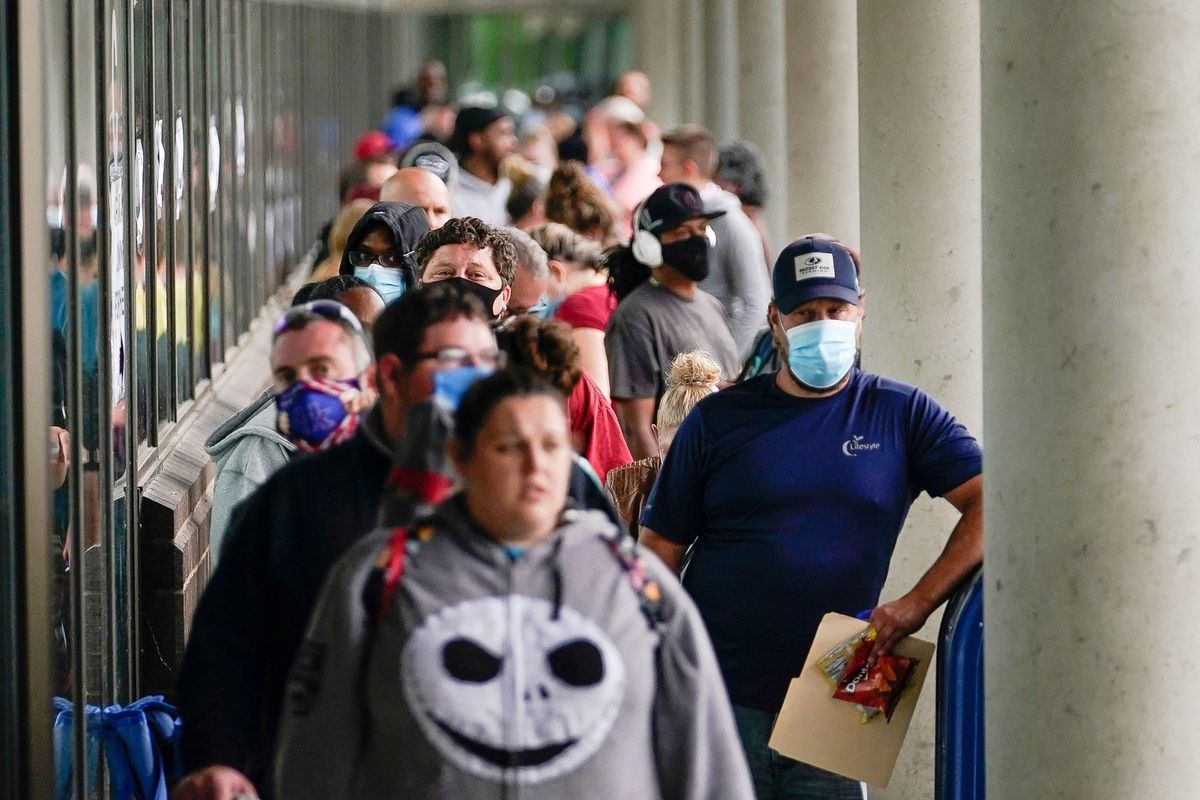Should Americans be paid to stay home as COVID cases rise?

A few minutes every morning is all you need.
Stay up to date on the world's Headlines and Human Stories. It's fun, it's factual, it's fluff-free.
Democratic Congresswoman Alexandria Ocasio-Cortez has argued that the US government needs to “pay people to stay home.”
As cases surge throughout the United States as the holiday season approaches, Americans are being urged to stay at home to prevent the continued spread of the coronavirus.
The Centers for Disease Control and Prevention (CDC) has broken ranks with the messaging coming from the highest levels of the American government to urge Americans to avoid celebrating Thanksgiving with those outside of their immediate households.
But with millions still following through on holiday plans and millions more still traveling, some have suggested that such pleas are insufficient.
Democratic Congresswoman Alexandria Ocasio-Cortez has argued that the US government needs to “pay people to stay home.”
Ocasio-Cortez may be right. States that adopted strict measures earlier in the crisis are not seeing the same surging case numbers as states that have operated under lax rules. The idea of paying people to stay at home also has an immediate precedent, as this is precisely what was done with the passage of the CARES Act in March.
One thing is certain – current methods of controlling the coronavirus pandemic in the US are failing on a national scale. For many Americans, staying home and not working isn’t feasible in the absence of expanded government support.
But with an outgoing administration and a lame-duck Congress, much-needed government support does not appear to be coming any time soon.
To pay, or not to pay?
The US is facing a COVID-19 situation that is deteriorating by the day.
The rapid growth in cases is particularly worrying. According to The New York Times, it took more than two weeks for case numbers within the US to increase from eight million to nine million in October. But the recent jump from 10 million cases to 11 million within the country has taken less than seven days.
In late November, the country officially passed the 12 million mark for coronavirus cases, with new daily cases approaching an astonishing 200,000.
The number of those hospitalized with the virus is also reaching record highs and threatens to put the American health care system under intense pressure.
These surging case numbers have led the CDC to urge Americans to refrain from traveling or celebrating Thanksgiving with those outside their immediate households.
Erin Sauber-Schatz, the head of the CDC’s community intervention and critical population task force, stated during a press briefing that “the safest way to celebrate Thanksgiving this year is at home with members of your household.”
Despite these warnings, millions of Americans still plan to fly or drive during the holiday weekend.
AAA Travel has estimated that some 55 million Americans will travel for the holiday, though this survey was conducted before the CDC gave their recommendations.
But just this past weekend, over three million Americans traveled through airports across the country, the most since mid-March.
Not only are millions planning to travel for the Thanksgiving holiday, but tens of millions more have continued commuting to work and places of leisure as “stay at home” orders and other restrictions have remained in limited effect across the US.
The only states with current stay at home orders are California, Ohio and New Mexico, with most others remaining more or less fully open.
As Eric Mathison, the founder and chief executive officer of the health ethics consulting firm Canmore Ethics, explained to TMS, “while some people are flouting stay-at-home requirements for ideological reasons, many continue to go to work because they have to.”
Mathison believes that only “expanding rent relief and unemployment insurance will allow these people to stay home, which will significantly help prevent the spread of COVID-19.”
It is within this context that Democratic Congresswoman Alexandria Ocasio-Cortez has called for Americans to be “paid” to stay at home.
The Congresswoman tweeted on November 19 that “To get the virus under control, we need to pay people to stay home.”
Former South Carolina Governor Nikki Haley sarcastically questioned whether Ocasio-Cortez wanted to “pay people to stay home from the money you take by defunding the police,” or through other means.
Ocasio-Cortez responded that “Republicans are mad at this when they literally just voted to do just this in March.” She added that Republicans’ refusal to consider this option now is because “last time they got a Wall Street bailout and this time all that’s left is helping working people, the disabled, the poor.”
Payment precedent
Ocasio-Cortez is right that in March the US paid people to stay at home.
The CARES Act, which received unanimous support in March when case numbers within the US were significantly less than they are at present, allocated some US$300 billion for direct cash payments.
These “stimulus checks,” about US$1,200 for most individuals, combined with expanded unemployment benefits for those out of work, effectively encouraged individuals to do their part to restrain the spread of the coronavirus by remaining at home. It was only effective, however, because most individuals did not have to worry about going out and working.
Similar efforts have been attempted in the months following the CARES Act.
House Bill 6496, the “Emergency Money for the People Act,” proposes that the Treasury Department make monthly payments to American citizens, in part so they can remain at home and help prevent the spread of COVID-19 within their communities.
But these measures have not received the unanimous agreement that greeted the CARES Act and it is unlikely that any new round of stimulus will be agreed upon before President-elect Joe Biden is inaugurated, especially with Congress in recess for the holidays.
But the notion of paying people to “stay at home” remains one with precedent, both in the US and around the world.
As Mathison told TMS, “more stimulus can only encourage people to stay at home,” but other incentives should be given alongside this. For instance, Mathison explained, “Hong Kong is paying people money if they test positive for COVID as a way to encourage testing.”
Similar initiatives are hard to find in the US and with most states remaining open for the time being and with no sign that any additional economic stimulus will be forthcoming, coronavirus cases nationwide are likely to continue rising.
Have a tip or story? Get in touch with our reporters at tips@themilsource.com




Comments ()